Readers are leaders. If you ever want to succeed as a leader, then you must make it a habit to read books. They say that “experience is the best teacher.” However, it was never said that we must learn from our experiences alone as we would not live long enough to experience all that life has to offer. Learning from the experiences of others is a great way to improve on yourself, grow, and attain peak heights in any endeavor.
What is the definition of leadership?
The persuading word, the straightforward march in the correct direction, the capacity to make judgments and be followed are all examples of leadership. From the way you make decisions to the way you talk and your ethical principles, everything matters.
Do you want to be a people’s leader, a corporate leader, or a revolution leader? Welcome to the top 20 leadership books.
Reading will not teach you how to lead, but books may teach you a lot about leadership.
Works by or about great leaders, as well as leadership theory, may teach you how to lead others. The best leadership books give knowledge in life, strategy, and business, even if you don’t learn how to lead.
Here are a few books that might help you learn more about the art of leadership.
1. In Search of Excellence by Thomas J. Peters and Robert H. Waterman Jr.
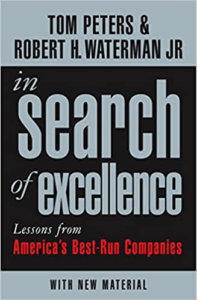
Every Business School in the Free World teaches it. This classic, dubbed the “Greatest Business Book of All Time” by some readers, requires reading by all executives.
To understand the secrets of management, Peters and Waterman analyzed 43 of America’s best-run firms. As a consequence, the two discovered eight fundamental management concepts.
This is the book for you if you require a fundamental management philosophy and company leadership. By teaching management philosophy, In Search of Excellence illustrates the value of management philosophy.
2. John C. Maxwell’s “Leadershift”
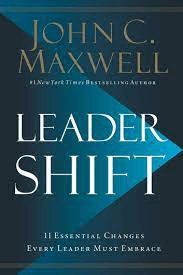
Leadershift (2019) is a book that teaches leaders and aspiring leaders how to build the capacity and willingness to make the adjustments in their leadership that will help them and their organizations flourish.
It demonstrates how, with the appropriate mentality and cutting-edge thinking, we can all achieve amazing things as leaders.
A new book by one of the world’s leading leadership gurus. Maxwell demonstrates how leaders can transform organizations by executing “Leadershifts.”
The book focuses on personal development and explores the changes that impacted his own profession.
3. Richard Reed’s “If I Could Tell You Just One Thing”

Richard Reed’s “If I Could Tell You Just One Thing: Encounters With Remarkable People And Their Most Valuable Advice.”
This is Sir Richard Branson’s favorite book on corporate leadership. “Given everything that you have experienced, given all that you now know, and given all that you have learned, if you could only pass on one piece of advice, what would it be?” Reed asks in the book.
Because many of the persons Reed interviewed were leaders in many areas, the study is relevant to leadership. Former President Bill Clinton (D-Arkansas) is among them, as is the Dalai Lama.
Reed was able to gather an unbelievable quantity of advice from remarkable people as a result of his study. For example, perfume businesswoman Jo Malone told Reed, “No situation is ever larger than you, no matter how awful it seems.” You always have three choices: alter the circumstance, accept the situation, or change your perspective on the issue.”
“If I Could Tell You Just One Thing” is the reference book for you if you’re seeking fundamental leadership lessons from a variety of experts.
In an easy-to-understand style, many of the quotations condense the core ideas, ideals, and values of great leaders. Some of the suggestions are practical, while others are motivational.
Anthony Bourdain, the late chef and television celebrity, gave tremendous strategic counsel to any leader or entrepreneur. Don’t work with “a**holes or poisonous and unpleasant individuals,” the adviser said.
Such nasty and annoying people squander time, money, and resources while making your life miserable, according to Bourdain’s simple but profound observation. Furthermore, they divert your attention away from your objectives while causing issues. An excellent fundamental approach for success is to avoid people who get in your way.
If you’re ready to listen, excellent advice and beneficial insights are all around you, according to the fantastic lesson “If I Could Tell You Just One Thing.” As a result, this novel serves as a lesson in the importance of paying attention and listening.
4. Max DePree’s “Leadership is an Art”
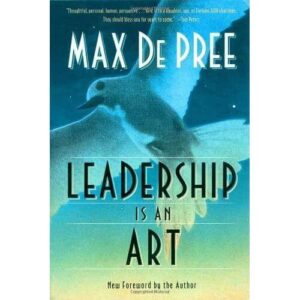
By discussing his experience as CEO of furniture manufacturer Herman Miller Inc., DePree demonstrates how to lead and motivate creative people.
A must-have for individuals working in industry, technology, entertainment, and other industries where innovation is vital to success.
Empathy and elegance, not strong words and severe punishment, are the keys to professional success, according to the finest leaders. When you approach leadership as an art form, you will not only enhance your organization, but also the lives of those you lead.
5. John C. Maxwell’s “Developing the Leader Within You”
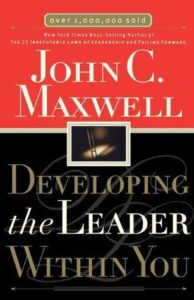
Maxwell’s classic analysis of leadership has been revised for the twenty-first century, with studies of various leadership styles.
Maxwell’s technique has the advantage of providing leadership insights for a wide range of areas, including church, government, and business.
The leadership influence and a breakdown of different sorts of leaders are the most significant insights Maxwell analyses.
6. Leading Change by John P. Kotter
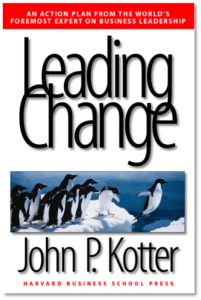
Leading Change is a wonderful depiction of ethical leadership in action in a competitive industry by someone who has walked the path.
Instead of resisting change, Kotter teaches leaders how to embrace it. Kotter, in particular, explains how not to handle change. Instead, he proposes a technique for leading change and guiding it on the right path.
Instead of resisting change, Kotter teaches leaders how to embrace it. Kotter, in particular, explains how not to handle change. Instead, he proposes a technique for leading change and guiding it on the right path.
This timeless classic is a necessary guide to surviving in today’s ever-changing world.
This is a must-read for executives in a business and technological environment that is constantly changing and disrupted. Kotter’s approach can help leaders understand how to use disruption to their advantage.
7. Horst Schulze’s “Excellence Wins”
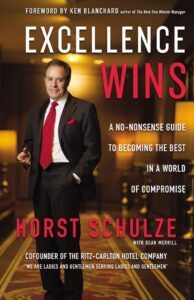
Excellence Wins: A No-Nonsense Guide to Becoming the Best in a World of Compromise by Horst Schulze and Dean Merrill.
Schulze, the former president of the Ritz-Carlton hotel group, explains his techniques for providing high-quality, uncompromising customer service in a throwaway world.
Schulze, in particular, reveals his strategies for encouraging people to become leaders.
8. Bob Iger’s “The Ride of a Lifetime”
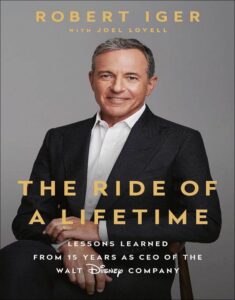
The Ride of a Lifetime: Lessons Learned from 15 Years as the CEO of the Walt Disney Company” “The Ride of a Lifetime: Lessons Learned from 15 Years as the CEO of the Walt Disney Company by Bob Iger – #1 NEW YORK TIMES BESTSELLER
One of the world’s best entertainment executives shares his leadership philosophy.
Iger says that treating business contacts with respect resulted in four of his most significant agreements. Pixar, Marvel Entertainment, Lucasfilm, and 21st Fox, the four firms that make up the contemporary Disney (NYSE: DIS) empire, were acquired as a consequence of Iger’s ties with their CEOs.
Part of the reason George Lucas sold Lucasfilm and Star Wars to Disney was because of how Iger treated him 20 years ago. To clarify, in the early 1990s, Iger, then an executive at ABC television, fulfilled his word and gave Lucas’s flop The Young Indiana Jones Chronicles two seasons. When Iger proposed to acquire Lucasfilm two decades later, Lucas recalled that.
Iger also discusses the benefits of optimism, boldness, justice, curiosity, focus, decisiveness, honesty, and thoughtfulness, among other values and qualities.
9. “Essentialism” by Greg McKeown
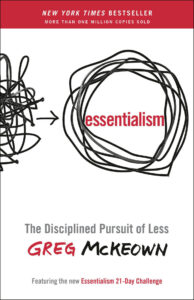
Essentialism (2014) by Greg McKeown shows you how to get more done by doing less. Essentialism helps you eliminate all of the clutter in the routine that keeps you from being genuinely productive and satisfied by providing practical methods for getting your priorities straight.
McKeown discusses a leader’s daily routine as well as the necessity of discipline. He gives specific tips on surviving the day-to-day difficulties that shape any business.
The art of everyday survival for leaders is the subject of this book, rather than big-picture thinking and principles.
10. Steven R. Covey’s “The 7 Habits of Highly Effective People”
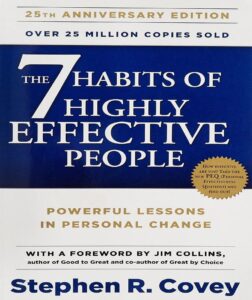
This is a once-in-a-generation leadership classic that stands up to its billing. For good cause, it was dubbed the “most important business book of the twentieth century.” Covey teaches managers how to spot the most productive workers and make the most of them.
Every Business School in the Free World teaches it.
One of the greatest action plans for managers available today. Covey’s book also serves as a useful primer on leadership concepts and philosophy. Anyone seeking to put together a team or create an organization should read this book.
The Seven Habits of Highly Effective People (1989) is a hugely popular self-help book that may teach you how to be more productive. You’ll be well on your way to more success in both your personal and professional life if you make these concepts a habit.
11. When the Buck Stops With You by Alan Axelrod, Ph.D.
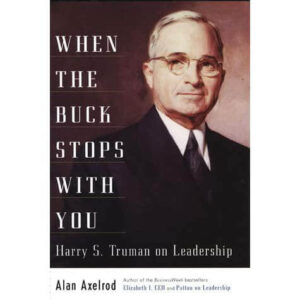
Harry S. Truman on Leadership
A highly interesting look at one of America’s greatest presidents’ leadership philosophies.
Truman had no prior experience in leadership or administration, yet he was catapulted into the world’s most powerful position during the height of World War II. For regular people, Axelrod does an excellent job explaining Truman’s leadership theory and principles.
This is an excellent book for regular individuals who find themselves in unexpected leadership roles. Many corporate executives are plucked from the shadows and thrust into leadership positions. Truman also had to make exceptional decisions, such as deploying the atomic bomb and negotiating with Joseph Stalin, one of the greatest tyrants in human history.
Truman’s capacity to adapt to unusual circumstances may serve as a model for any leader in any circumstance. Axelrod does everyone a favor by extracting a set of leadership ideals from Truman’s career and sayings that anybody can implement.
This is a rare book, with just a few copies available on Amazon; it is well worth the money.
12. Daniel Goleman’s “Emotional Intelligence”
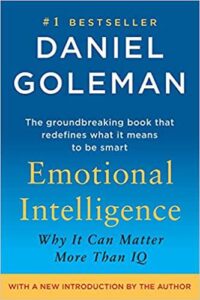
Goleman analyses the mental and emotional characteristics that make individuals successful in this behavioral science classic. This book is essential for leaders because it explains what personality qualities to look for in workers and, more importantly, what types of people to avoid if they want to succeed. Emotional Intelligence also provides a consistent philosophy of leadership and success, as well as examples of how those concepts relate to specific team members.
Understanding Emotional Intelligence can help managers better understand their workers’ motives and thinking. This crucial task will also assist you in identifying emotional strengths and weaknesses in yourself and individual team members. Knowing those characteristics can help a group of people work together more effectively.
13. Gary P. Pisano’s Creative Construction”
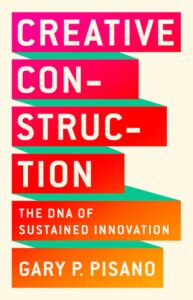
Creative Construction: The DNA of Sustained Innovations by Gary P. Pisano’s.
Professor Pisano of Harvard Business School believes that huge corporations can flourish in a changing environment.
Pisano debunks the myth that only startups can innovate and break into new areas. An intellectual framework for analyzing disruption, called Creative Construction.
Pisano focuses on helping large, established businesses adjust to shifting market conditions. Pisano spent three decades researching ground-level disturbance. This book is for you if you need a different viewpoint on today’s market.
14. Jim Harter’s “First, Break All the Rules”
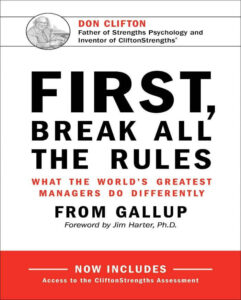
First, Break All the Rules: What the World’s Greatest Managers Do Differently by Jim Harter.
This book is based on a Gallup research of over 80,000 managers from 400 firms over 25 years. The goal was to figure out what sets the top managers apart from the rest.
This book discusses human resource management, team development, team leadership, and employee/manager relationships. Lori Goler, Facebook’s Vice President of People, is one of the book’s devotees.
The most essential takeaway from this book is that a manager’s behavior influences the performance of his or her employees. The distinctions between managers and leaders are highlighted by Harter. Managers focus inside to watch the minutiae, while leaders look outward to see the larger picture.
As a result, Harter provides valuable insight into the distinction between management and leadership. The lesson is that great leaders must be willing to alter everything and break with the past. In today’s environment of constant disruption, leaders who do not understand that lesson will fail.
Pisano also demonstrates how to get the most out of top performers. This book has the benefit of being based on guidance from real company executives who are in the workplace every day, rather than academics.
15. Youngme Moon’s “Different”
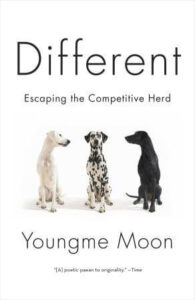
Different: Escaping the Competitive Herd by Youngme Moon.
Professor Youngme Moon of Harvard Business School demonstrates how to make a brand stand out in today’s crowded and hyper-competitive industry.
Young’s original study on Google and IKEA demonstrates how industry disruptors may create strong brands. I recommend that anybody looking for a unique route to success have a look at Different.
This book also serves as an excellent primer on branding and marketing in today’s environment. This book is for you if you want to create something fresh and distinctive.
16. Ken Segall’s “Insanely Simple”
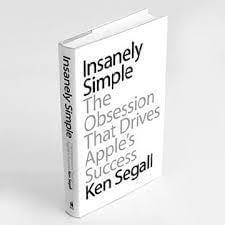
Insanely Simple: The Obsession That Drives Apple’s Success by Ken Segall.
This book explains and investigates the basic concept that led Apple (NASDAQ: AAPL) to a market value of $1 trillion.
Steve Jobs preached a concept of simplicity. By sitting in the conference room with Jobs, Segall had firsthand experience with that attitude.
Segall explains how Jobs turned that idea into a reality and utilized it to propel Apple’s remarkable comeback in the book. Segall demonstrates how Apple’s ideology led the company to perform better, quicker, and earn more money.
Insanely Simple is a must-read for anybody who wishes to apply their philosophy and beliefs to a business. This is the book for you if you need a fundamental business philosophy to help you develop your approach. It also serves as an excellent primer in marketing, advertising, strategy, and design.
Insanely Simple is the book to read if you want a basic, easy-to-understand, yet proven business concept. Any leader who understands the value of simplicity will have an easier time succeeding.
17. Rita McGrath’s Seeing Around Corners”
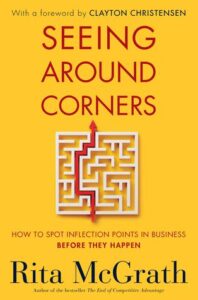
Seeing Around Corners: How to Spot Inflection Points in Business Before They Happen by Rita McGrath.
Professor Rita McGrath of Columbia Business School poses the intriguing topic, “How do leaders foresee change and disruption before they happen?”
Change and upheaval in business flow from inflection moments, according to McGrath. As a result, leaders who can recognize inflection points can benefit from them. For example, Steve Jobs saw the smartphone’s inflection moment and predicted how it might become a major source of entertainment and information.
Jobs was a genius at recognizing inflection moments and grabbing power early, which is why Apple is so successful today. Jobs saw cellphones as having the potential to generate a massive market for digital entertainment, so he launched the App Store.
McGrath outlines many methods for detecting and exploiting inflection moments. She also demonstrates how to decentralize strategy to identify many routes to success and consumer loyalty.
McGrath also demonstrates how entrepreneurs may anticipate new technology and industries and capitalize on them. She does so by looking at Netflix’s recognition of streaming video and the development of a platform to profit from it.
Because of its focus on digital platforms and marketplaces, Seeing Around Corners is a timely book. Seeing Around Corner is a must-read for anybody interested in learning where a business is headed and how to plan for it.
18. Nicolaj Siggelkow’s “Connected Strategy”
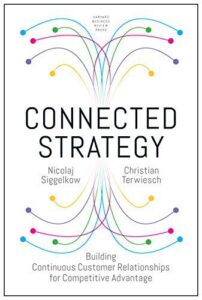
Connected Strategy: Building Continuous Customer Relationships for Competitive Advantage by Nicolaj Siggelkow and Christian Terwiesch.
This book addresses the crucial topic of “how do you transform a casual shopper into a loyal customer?” The writers present a complete customer service approach that focuses on building connections.
A linked approach combines technology with conventional customer service to maximize efficiency. Any CEO who wishes to prioritize connection development and customer service should use the Connected Strategy.
19. Michael Lewis’s “The Fifth Risk”
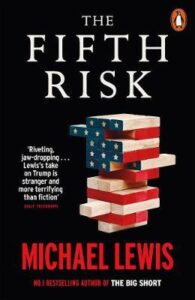
On the morning after Trump was elected president, the individuals in charge of the US Department of Energy – an agency tasked with dealing with some of the world’s most dangerous threats – awaited the arrival of the new administration’s transition team. Nobody showed up. The same thing happened across the US government: nothing.
One of the most illustrious living business authors looks at leadership from a different angle than middle managers and workers. Lewis looks at the careers of long-serving federal government employees in the United States.
Lewis demonstrates how mid-level managers are critical to excellent civil service and organizational consistency. This is a must-read for managers and leaders who want to understand their subordinates.
20. John Brooks’ “Business Adventures”
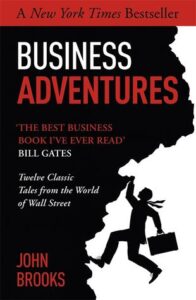
“Business Adventures: Twelve Classic Tales from the World of Wall Street” by John Brooks’.
Warren Buffett and Bill Gates both like reading this classic. In fact, Gates admits that Buffett suggested Business Adventures to him.
Buffett’s favorite business book, according to Gates, is Business Adventures. Business, according to the Microsoft co-founder, is the finest business book he’s ever read.
Brooks examines key events in the history of big corporations to deconstruct corporate life and commercial strategy. Brooks, for example, looks at Ford’s Edsel car’s tragic failure and Xerox’s triumph.
This book will help you understand why two of today’s most successful business executives are so successful.
Summary
Successful leaders read because they are always looking for fresh information and insight.
You will be a better leader if you study more about leadership. You could succeed as a leader if you tell yourself, “I know nothing about leading and need to learn.”
